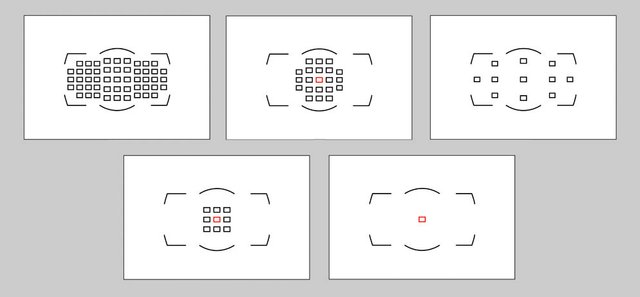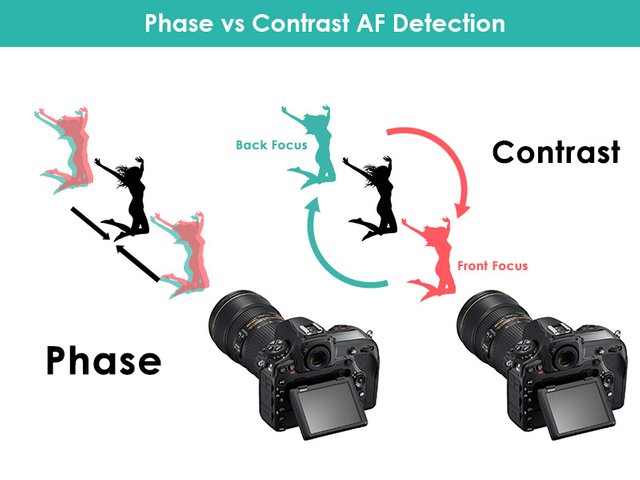Focus settings:

In the previous lessons we've discussed the size of the photo, shooting functions and the lighting meter.
In this lesson, we will discuss the method of focussing.
Before taking a photo we have to decide on the following:
- Size of the photo (quality) RAW or JPEG
- Shooting functions – fully automatic or fully creative
- Lighting meter
- Decide on the lens opening and shutter speed.
- Which method of focussing are you using?
- Composition
- Take a test photo
4. Deciding on the aperture and shutter speed
By choosing the correct combination of the aperture and shutter speed, you will be able to see a big difference in the photos taken.

Right combination of aperture and shutter speed
5. Focus:
When looking through the viewfinder of the camera, and you press the shutter button in softly (halfway), you will see different autofocus “dots/lights” blinking. You will also hear a “beep” sound. These dots are there for the photographer to see a sharper image or an image in focus. In the basic shooting settings, for example portrait, landscape, sport etc. the camera will find these spots automatically and will choose this specific one to focus on. (Usually the object closest to you) which is not necessarily what you want to focus on.
You can choose which focus point to use by changing the setting.
The different focus points differ from camera models. The Nikon D40 has 3, Canon 500D has 9, Nikon D9000 has 11 and the Canon 7D has 19.
When using the cameras live view, the speed of the autofocus lowers, and the photographer must decide in which direction the object is moving.
The photographer can decide what to focus on by changing the focus setting. The AF button on the camera, when pressed, will indicate these focus dots on the LCD screen. By turning the “wheel” in front of the camera you will be able to choose the focus point you want to use.
Auto focus mode:

The modern digital camera has an automatic focus setting, which will stay focused on an object, even if it is moving.
This function works in 2 ways:
Measuring the contrast:
The non-complicated AF function and used in most beginner cameras. This determines where the most contrasting pixels are and helps the lens with a sharper focus.

Phase detection
This is the more complicated AF function and used in more complicated compact and dSLR cameras.
Light that reflects from the object is divided into two different parts of the lens. The AF sensor compares the different parts, which activates the AF sensors to make changes to the lens.
If there is bad/low light, the cameras AF function will look for a point to focus on, you will be able to hear the camera trying to focus, as it is looking for something to focus on.
If the camera does not have this AF setting, the flash will open automatically.

Nice tutorial on camera use, most of us enjoy sharing, learning on the move. Some good pointers always help thanks @apteacher
Your post has been selected to be entered into @teamsouthafrica's Daily Nominated Post section in Teamsouthafrica's Discord group. Congratulations!
#teamsouthafrica
https://discord.gg/9KVccPH Come Connect.
Downvoting a post can decrease pending rewards and make it less visible. Common reasons:
Submit
Thank you @joanstewart
Downvoting a post can decrease pending rewards and make it less visible. Common reasons:
Submit
Dear @apteacher, very informative and the first time that I have read one of your great posts! Do you perhaps have anything on the Canon Powershot SX60 HS camera's? I love nature and apart from our charity shoots, most of my posts are about the miracles of nature! But ask me anything about settings and I have no idea. I fiddled with the shutter speeds until I thought that I get great results, but I know that they can still be improved! Sorry for the long scribe! Blessings and upvoted!
Downvoting a post can decrease pending rewards and make it less visible. Common reasons:
Submit
Hi @papilloncharity, the Canon powershot forms part of the bridge camera. The one between the compact and dslr camera. I also have the powershot, but the 50HS which also takes beautiful pictures as it has different settigs built in. I know you can take “fisheye, focus on one color of the image and toy-camera” settings etc. These “options” makes it really fun to play around with until you are familiar with them. Remember that when you want to “blur” an image, for example water, the shutter speed must be set to a lower speed and fast moving objects you will use a faster shutter speed to “freeze” the image. Also remember that if you change the shutter speed it might take a bit longer to capture the next image as it is processing slower to reduce noise on the image.
I will look into the 60HS but think it is similar to the 50HS.
I usually use thake photos with the Canon 7D and use the 50HS for playing around when I see something nice although the powershot comes in quite handy sometimes.
Downvoting a post can decrease pending rewards and make it less visible. Common reasons:
Submit
Wow! Thank you for the detailed reply! Just to let you know that I am waiting for the 70HS, as I hear that the zoom will be even further extended. Unfortunately, as a missionary, I cannot afford the more expensive cameras, but the 60HS has served me well, especially with big and clear moonshots. Thank you once again and I will start to fiddle with the settings! Blessings! @apteacher
Downvoting a post can decrease pending rewards and make it less visible. Common reasons:
Submit
Pleasure, good luck and enjoy your photography!!
Downvoting a post can decrease pending rewards and make it less visible. Common reasons:
Submit
Downvoting a post can decrease pending rewards and make it less visible. Common reasons:
Submit
what do you think about https://binocularsumo.com/reviews/auto-focus/
Downvoting a post can decrease pending rewards and make it less visible. Common reasons:
Submit
Also, you read and think about https://www.cameraio.com/
Downvoting a post can decrease pending rewards and make it less visible. Common reasons:
Submit
Also, what do you think about https://binocularman.com/best-automatic-focusing-binoculars/
Downvoting a post can decrease pending rewards and make it less visible. Common reasons:
Submit